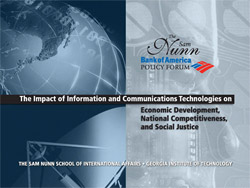The 2006 Sam Nunn Policy Forum Executive Summary is now available.
 Modern information and communications technologies (ICTs) have revolutionized work and play and serve as core enablers for today's national and international economies and societies. These global networks enhance many aspects of economic welfare and social justice. Global communication is a two-edged sword, however. Rarely are some of the negative consequences of these systems and the differential access to the benefits of ICTs studied in a serious and purposeful way, although such reflection is critical if we intend to mitigate the harmful effect and maximize the positive potentials of these new technologies.
Modern information and communications technologies (ICTs) have revolutionized work and play and serve as core enablers for today's national and international economies and societies. These global networks enhance many aspects of economic welfare and social justice. Global communication is a two-edged sword, however. Rarely are some of the negative consequences of these systems and the differential access to the benefits of ICTs studied in a serious and purposeful way, although such reflection is critical if we intend to mitigate the harmful effect and maximize the positive potentials of these new technologies.
The 2006 Policy Forum will begin a multi-year effort to study the tension between the promise and peril of global ICTs in economic development and health, national economic strength, and social justice. ICTs hold great promise for economic development, the empowerment of women and marginalized groups, and the reconciliation of post-conflICT societies. Yet while ICTs can bridge social divides, they can also be used to reinforce and create them.
For many, the image of an Indian information technology (IT) entrepreneur is that of a young, middle-class, college-educated male working from a modern air-conditioned office in Bangalore. But in some cases, Internet professionals have a different face, such as poor and disenfranchised Muslim women working on ICT skills and small business development from rural villages and urban slum clusters. A variety of projects in India and elsewhere have demonstrated that the poorest of the poor can benefit economically from modern ICTs thanks to the cost savings they enable, as well as the direct business and livelihood opportunities they afford. But ICTs present potential problems as they relate to economic growth and equality. Scholars are debating both nationally and globally about an economic opportunity divide based upon lack of computer skills and the widening economic disparity emerging from the new economy. Moreover, some authors have argued that negative implications of the Internet weigh heaviest on least-developed countries and the poorest segments of more advanced states that are unprepared to benefit from new ICTs. Morning panelists will discuss ICT issues affecting economic development, equity, and national competitiveness.
The successful utilization of the information superhighway is predicated on the assumption that everybody has a realistic opportunity to use ICTs and that they are designed and set up in a gender and culturally neutral way. But if ICTs do not take into account the social context in which they are expected to function, they can fortify existing social, political, and economic inequities. Awareness of the gender and racial dimensions of new technologies is particularly important as gender and racial biases are notoriously deep-seated and complex. Moreover, the Internet has become a very effective tool for the dissemination of racist and anti-Semitic propaganda, as well as the organizational and recruitment efforts of supremacist groups around the world. Afternoon panelists will discuss, with a global perspective, the opportunities and limits of gender empowerment through ICTs, the impact of race and poverty on digital access, and the utilization of the Internet by hate groups.
The Sam Nunn Bank of America Policy Forum 2006 will be at the Georgia Tech Global Learning & Conference Center (GLCC) located at 85 5th Street, NW, Atlanta. GLCC is located next to the Georgia Tech Hotel and Conference Center. Registration will begin at 7:30 a.m. The program will begin at 8:30 a.m. and continue until 4 p.m.
